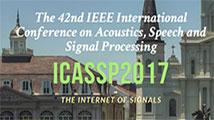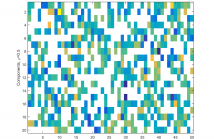
ICASSP is the world's largest and most comprehensive technical conference on signal processing and its applications. It provides a fantastic networking opportunity for like-minded professionals from around the world. ICASSP 2017 conference will feature world-class presentations by internationally renowned speakers and cutting-edge session topics. Visit ICASSP 2017
- Read more about Compressed Beam-Selection In Millimeter Wave Systems With Out-of-band Partial Support Information
- Log in to post comments
Compressed beam-selection (CBS) exploits the limited scattering of the millimeter wave (mmWave) channel using compressed sensing (CS) and finds the best beam-pair with limited overhead. The CBS procedure can further benefit from the knowledge of some additional structure in the channel. As mmWave systems are envisioned to be deployed in conjunction with sub-6 GHz systems, we use the spatial information extracted at sub 6 GHz as out-of-band side information about the mmWave channel.
- Categories:
 13 Views
13 Views
- Read more about Estimation in Autoregressive Processes with Partial Observations
- Log in to post comments
We consider the problem of estimating the covariance matrix and the transition matrix of vector autoregressive (VAR) processes from partial measurements. This model encompasses settings where there are limitations in the data acquisition of the underlying measurement systems so that data is lost or corrupted by noise. An estimator for the covariance matrix of the observations is first presented.
- Categories:
 4 Views
4 Views- Read more about Estimation in Autoregressive Processes with Partial Observations
- Log in to post comments
We consider the problem of estimating the covariance matrix and the transition matrix of vector autoregressive (VAR) processes from partial measurements. This model encompasses settings where there are limitations in the data acquisition of the underlying measurement systems so that data is lost or corrupted by noise. An estimator for the covariance matrix of the observations is first presented.
- Categories:
 4 Views
4 Views- Read more about End-to-End Joint Learning of Natural Language Understanding and Dialogue Manager
- Log in to post comments
Natural language understanding and dialogue policy learning are both essential in conversational systems that predict the
- Categories:
 13 Views
13 Views- Read more about Inter-Block Dependencies Consideration Applied to Intra Coding in H.264/AVC and HEVC standards
- Log in to post comments
Recent MPEG video compression standards are still block-based: blocks of pixels are sequentially coded using spatial or temporal prediction schemes. For each block, a vector of coding parameters has to be selected. In order to limit the complexity of this decision, independence between blocks is assumed, and coding parameters are locally optimized to maximize the coding efficiency. Few studies have investigated the benefits of inter-block dependencies consideration using Joint Rate-Distortion Optimization (JRDO), especially in Intra coding.
- Categories:
 8 Views
8 Views
- Read more about Spatio-Temporal Binary Video Inpainting via Threshold Dynamics
- Log in to post comments
We propose a new variational method for the completion of moving shapes through binary video inpainting that works by smoothly recovering the objects into an inpainting hole. We solve it by a simple dynamic shape analysis algorithm based on threshold dynamics. The model takes into account the optical flow and motion occlusions. The resulting inpainting algorithm diffuses the available information along the space and the visible trajectories of the pixels in time. We show its performance with examples from the Sintel dataset, which contains complex object motion and occlusions.
- Categories:
 14 Views
14 Views- Read more about Fast Hyperspectral Unmixing in Presence of Sparse Multiple Scattering Nonlinearities
- Log in to post comments
- Categories:
 8 Views
8 Views- Read more about DRUM TRANSCRIPTION FROM POLYPHONIC MUSIC WITH RECURRENT NEURAL NETWORKS
- Log in to post comments
Automatic drum transcription methods aim at extracting a symbolic representation of notes played by a drum kit in audio recordings. For automatic music analysis, this task is of particular interest as such a transcript can be used to extract high level information about the piece, e.g., tempo, downbeat positions, meter, and genre cues. In this work, an approach to transcribe drums from polyphonic audio signals based on a re- current neural network is presented. Deep learning techniques like dropout and data augmentation are applied to improve the generalization capabilities of the system.
- Categories:
 57 Views
57 Views- Read more about RANDOM MATRICES MEET MACHINE LEARNING: A LARGE DIMENSIONAL ANALYSIS OF LS-SVM
- Log in to post comments
This article proposes a performance analysis of kernel least squares support vector machines (LS-SVMs) based on a random matrix approach, in the regime where both the dimension of data p and their number n grow large at the same rate. Under a two-class Gaussian mixture model for the input data, we prove that the LS-SVM decision function is asymptotically normal with means and covariances shown to depend explicitly on the derivatives of the kernel function. This provides improved understanding along with new insights into the internal workings of SVM-type methods for large datasets.
- Categories:
 22 Views
22 Views- Read more about Dialog Context Language Modeling with Recurrent Neural Networks
- Log in to post comments
We propose contextual language models that incorporate dialog level discourse information into language modeling. Previous works on contextual language model treat preceding utterances as a sequence of inputs, without considering dialog interactions. We design recurrent neural network (RNN) based contextual language models that specially track the interactions between speakers in a dialog. Experiment results on Switchboard Dialog Act Corpus show that the proposed model outperforms conventional single turn based RNN language model by 3.3% on perplexity.
- Categories:
 20 Views
20 Views